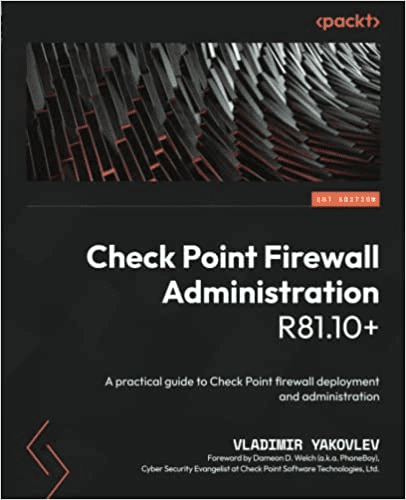Vladimir Yakovlev is the author of Check Point Firewall Administration R81.10+, we got the chance to sit down and find out more about his experience of writing with Packt.
Q: What are your specialist tech areas?
Vladimir: Information Technology infrastructure and security architecture.
Q: How did you become an author for Packt?
Vladimir: I was initially approached by Packt with the request to write the book on Check Point firewall administration. Having written a number of technical papers, but never a textbook, the prospect of trying my hand at it was both interesting and daunting. Creating a learning tool for such a huge name in cybersecurity as Check Point, and especially their flagship products used across the world, comes with tremendous responsibility and personal exposure. It took a lot of soul searching to be sure that I am up to the task and ready to commit the necessary time and effort to do this project justice.
Q: What kind of research did you do, and how long did you spend researching before beginning the book?
Vladimir: It took me a few months to convince my publisher that the first book on this subject cannot be called “Mastering Check Point Administration”, as it takes years to achieve that, and a lot more information than a single book. The initial research was primarily focused on coming up with the concept of structuring the book to be practical and sufficiently broad in scope, while deep in substance, to be of value to the reader.
The above paragraph described the initial research, before I embarked on the writing journey. During the time that it has taken to write the book I had to read an insane amount of documentation and innumerable blog posts, consult with my peers and perform endless tests in the lab environments to ensure the validity of statements and the accuracy of information that made it into the book.
Q: Did you face any challenges during the writing process? How did you overcome them?
Vladimir: Absolutely. From what I’ve heard, only Stephen King can write the book from start to end without challenges 🙂 Perhaps, modern AIs are getting close to it these days. Because of the specific ways in which I have decided to present information in one of the chapters, it has taken five tries and three months to get it right. I’m sure it is different for everyone, but for me, getting over that hump has taken a combination of persistence, desire to elegantly explain a difficult subject, a commitment to deliver the promised product, and an outright refusal to fail at it.
You write key statements, revisit those a few days later to see if they still ring true. If not, scrap and rewrite anew. Expand that to paragraphs, sections and chapters. Keep the good parts and see if presenting those in a different order makes better sense.
Asking my friends and family members to read the bits you are unsure of, not the technical part, but the sentence structure and sequence, gauge their reactions and listen to their feedback. Rinse and repeat.
Q: What’s your take on the technologies discussed in the book? Where do you see these technologies heading in the future?
Vladimir: Ultimately, the book is about access control. I am keenly aware that there are numerous new ways in which it is now being implemented, but there is always going to be a need for firewalls, be it a host-based or a dedicated physical or virtual appliances. It is becoming more granular and intelligent and is combined with the threat prevention capabilities. Evolving AI and machine learning capabilities greatly aid in its dynamic application. I see this trend continuing and ultimately culminating in augmentation of administration functions with desired extrapolated outcomes.
Q: Why should readers choose this book over others already on the market? How would you differentiate your book from its competition?
Vladimir: There are no current competing publications. The last book covering same breadth of subject matter was Essential Check Point FireWall-1 NG: An Installation, Configuration, and Troubleshooting Guide written by Dameon D. Welch-Abernathy in 2004. Who, in addition to being an acknowledged authority on this subject, did me an honor of being my technical reviewer on this project.
Another great resource for Check Point administrators is the book by Timothy Hall, Max Power 2020: Check Point Firewall Performance Optimization. Tim, too, was involved in helping me out as the expert in deep-diving on specific subjects and greatly assisting me with sanity checks throughout this process.
Having these two people taking an interest and willing to help with this project has meant the world to me, while also putting a pressure to produce the best work I possibly could.
I am happy to report that both of them are impressed with the outcome 🙂
Q: What are the key takeaways you want readers to come away with from the book?
Vladimir: As technologists in information security, we are working with increasingly complex products in incredibly complex environments under challenging circumstances. It is easy to get overwhelmed and fall into a trap of narrow specialization. Try to avoid that at all cost. Look at the bigger picture, recognize that what you are working on is a piece of a puzzle that makes this modern world of ours work. Remember that what you do is incredibly important and take pride in your role as defenders on the front lines of the information age. Try to get better at what you do.
Q. What advice would you give to readers learning tech? Do you have any top tips?
Vladimir: Yes of course: step by step good things will come. Do not disregard the fundamentals, learn something new every day and, periodically, try something new, until you succeed at making it work. In time, you’ll get to recognize the feeling of immense satisfaction accompanying well executed projects. I wish you to have a lot of these moments!
Q. What are your favorite tech journals? How do you keep yourself up to date on tech?
Vladimir: While I do not maintain a personal blog, I do occasionally post articles on LinkedIn and the readers may follow me on https://www.linkedin.com/in/vladimiry/ or in Check Point user community, as “Vladimir“.
Q. Can you share any blogs, websites and forums to help readers gain a holistic view of the tech they are learning?
Vladimir: Absolutely. The foremost is the Check Point user community CheckMates at https://community.checkpoint.com/.
Additional great resources are available on Rick Hoppe’s site https://checkpoint.engineer/.
There were quite a few more resources previously, but it looks like most of the standalone blog authors have migrated to CheckMates.
Q. How would you describe your author’s journey with Packt? Would you recommend Packt to aspiring authors?
Vladimir: If you are contacted by Packt, it is likely that you were recommended by someone who values your knowledge, abilities, and contribution to the specialty you are working in. Take the offer seriously and consider whether you can dedicate the necessary time and effort to produce a book that readers can benefit from.
Do not fight with editors (too hard). They know what works and are, largely, correct. That said, if there are sticking points in how you want to present the material, iron them out earlier in the project.
Remember, this is a binding contract and you want to deliver the best possible work in the time allotted to the project.
Q. Do you belong to any tech community groups?
Vladimir: I belong to ISC2, Check Point community CheckMates and a number of technology, security, and compliance groups and communities on LinkedIn.
Q. What are your favorite tech journals? How do you keep yourself up to date on tech?
Vladimir: I consume an insane amount of information from wide ranging sources: professional publications, personal blogs, video tutorials and books. While I have great affinity for Check Point, my work as infrastructure and security solutions architect requires an unbiased, vendor-neutral approach to technologies and methodologies. I am also frequently involved in discussions with R&D and engineers from different companies.
Q. How did you organize, plan, and prioritize your work and write the book?
Vladimir: I have the luxury to pick and choose the projects I am working on, so it was not too difficult to make time for this endeavor. As this is not typically the case for most people, I do not consider my example to be helpful in this regard.
Q. What is that one writing tip that you found most crucial and would like to share with aspiring authors?
Vladimir: I think the most important factor for me was the willingness of two previous authors on this subject matter to be engaged with me throughout this project. To help with sanity checks and with the technical review of written chapters. Before you commit to something like this, reach out to those in respective communities whose knowledge and opinion you value. Ask them to be involved.
Q. Would you like to share your social handles? If so, please share.
Vladimir: CheckMates (https://community.checkpoint.com/): Vladimir
ISC2 (https://community.isc2.org/): vt100
LinkedIn: https://www.linkedin.com/in/vladimiry/
You can find Vladimir’s book on Amazon by following this link: Please click here









